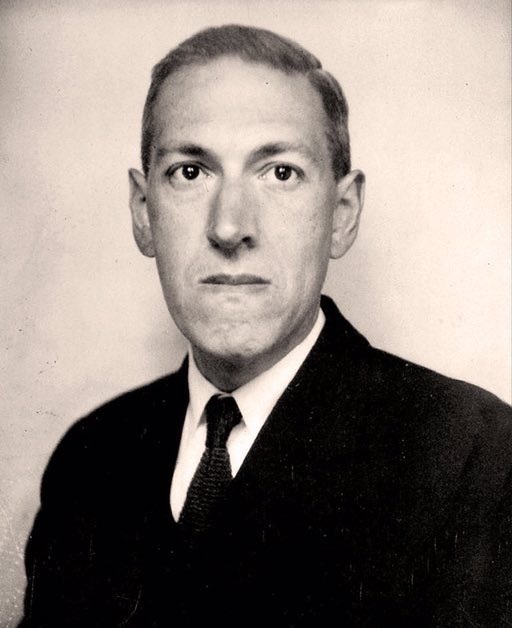„Nešťastný je ten koho spomienky sú naplnené iba hrôzou a smútkom.“
poviedka: Vydedenec,The Outsider
Potvrdené výroky
Howard Phillips Lovecraft bol americký autor sci-fi, fantasy a hororov.

„Nešťastný je ten koho spomienky sú naplnené iba hrôzou a smútkom.“
poviedka: Vydedenec,The Outsider
Potvrdené výroky
„Čo vo večnosti leží mŕtve nie je, v záhade vekov sa i smrť vo smrť navždy zmení.“
iný preklad: Nie je mŕtve to čo môže večne dumať a po zvláštnych érach aj smrť môže skonať.
iný preklad: Nie vždy je mŕtve to, čo nekonečné veky leží nehybne, a v podivných vekoch vekov ani len smrť sa smrti nevyhne.
poviedka: Volanie Cthulhu
Potvrdené výroky
poviedka: Vydedenec,The Outsider
Potvrdené výroky
poviedka: Vydedenec,The Outsider
Potvrdené výroky
poviedka: Tá vec na prahu
Potvrdené výroky
„Spomienky si uchovávajú výlučne chudí a osamelí“
poviedka: Slávnosť
Potvrdené výroky
„Ale vo vesmíre nájdeme balzam rovnako ako horkosť. A tým balzamom je zabudnutie.“
poviedka: Vydedenec,The Outsider
Potvrdené výroky
Fiction, The Call of Cthulhu (1926)
Kontext: The most merciful thing in the world, I think, is the inability of the human mind to correlate all its contents. We live on a placid island of ignorance in the midst of black seas of infinity, and it was not meant that we should voyage far. The sciences, each straining in its own direction, have hitherto harmed us little; but some day the piecing together of dissociated knowledge will open up such terrifying vistas of reality, and of our frightful position therein, that we shall either go mad from the revelation or flee from the light into the peace and safety of a new dark age.
“One of those creatures wrote you once, ‘do not call up any that you can not put down’.”
often phrased as "Do not call up that which you cannot put down."
Fiction
Zdroj: "The Case of Charles Dexter Ward", written 1927, first published in Weird Tales, July 1941
Fiction, The Call of Cthulhu (1926)
Kontext: It was from the artists and poets that the pertinent answers came, and I know that panic would have broken loose had they been able to compare notes. As it was, lacking their original letters, I half suspected the compiler of having asked leading questions, or of having edited the correspondence in corroboration of what he had latently resolved to see.
Fiction
Zdroj: "Dagon" - Written Jul 1917; First published in The Vagrant, No. 11 (November 1919)
"Beyond the Wall of Sleep" in Pine Cones, Vol. 1, No. 6 (October 1919)
Fiction
Fiction
Zdroj: "The Thing on the Doorstep" (1937), first published in Weird Tales
"The Tomb" - Written Jun 1917; first published in The Vagrant, No. 14 (March 1922)<!-- p. 50-64 -->
Fiction
Kontext: In relating the circumstances which have led to my confinement within this refuge for the demented, I am aware that my present position will create a natural doubt of the authenticity of my narrative. It is an unfortunate fact that the bulk of humanity is too limited in its mental vision to weigh with patience and intelligence those isolated phenomena, seen and felt only by a psychologically sensitive few, which lie outside its common experience. Men of broader intellect know that there is no sharp distinction betwixt the real and the unreal; that all things appear as they do only by virtue of the delicate individual physical and mental media through which we are made conscious of them; but the prosaic materialism of the majority condemns as madness the flashes of super-sight which penetrate the common veil of obvious empiricism.
Fiction, The Call of Cthulhu (1926)
Letter to E. Hoffmann Price (15 August 1934) , quoted in Lord of a Visible World: An Autobiography in Letters edited by S.T. Joshi, p. 268
Non-Fiction, Letters, to E. Hoffmann Price
Letter to Natalie H. Wooley (2 May 1936), in Selected Letters V, 1934-1937 edited by August Derleth and Donald Wandrei, pp. 240-241
Non-Fiction, Letters
Fiction, The Call of Cthulhu (1926)
Letter to Alfred Galpin (27 May 1918), published in Letters to Alfred Galpin edited by S. T. Joshi, p. 18
Non-Fiction, Letters
Fiction, The Crawling Chaos (1921)
Letter to J. Vernon Shea (7 August 1931), quoted in "H.P. Lovecraft, a Life" by S.T. Joshi, p. 579
Non-Fiction, Letters
Fiction, The Call of Cthulhu (1926)
Fiction, Hypnos (1922)
Letter to Clark Ashton Smith (7 November 1930), in Selected Letters III, 1929-1931 edited by August Derleth and Donald Wandrei, p. 214
Non-Fiction, Letters
Fiction, The Crawling Chaos (1921)
"The Temple" - Written 1920; first published in Weird Tales, 6 No. 3 (September 1925)
Fiction
Letter to Harry O. Fischer (late February 1937), in Selected Letters V, 1934-1937 edited by August Derleth and Donald Wandrei, pp. 416-417
Non-Fiction, Letters
Fiction, The Crawling Chaos (1921)
Fiction, The Call of Cthulhu (1926)
"Ex Oblivione" - First published in The United Amateur, 20, No. 4 (March 1921)
Fiction
"The Hound" Written September 1922, published February 1924 in Weird Tales, 3, No. 2, 50–52, 78
Fiction